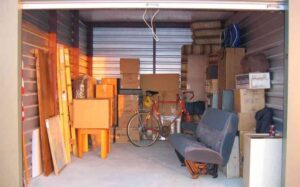What is a Storage Unit Business for sale? Imagine having a place where people can store their excess belongings, business inventory, or even vehicles when they don’t have enough space at home or work. That’s exactly what a storage unit business offers. It’s a service that provides secure, rented spaces for personal or business storage needs.
Importance and Demand for Storage Units. In today’s world, where urban living spaces are shrinking and consumerism is on the rise, the demand for storage units has skyrocketed. Whether it’s a growing family needing extra room or businesses requiring additional storage for their stock, storage units have become essential.
Purpose of the Article. This article aims to provide a detailed guide for anyone interested in purchasing a storage unit business. We’ll cover everything from understanding the industry and its benefits to the financial and legal aspects of buying and running one.
Understanding the Storage Unit Business
Types of Storage Units
Personal Storage

People who need more space for their stuff usually rent personal storage facilities. These could include furniture, seasonal items, or even personal collections.
Business Storage

Businesses often need additional storage for inventory, equipment, or records. Business storage units cater to these needs, offering secure and accessible spaces.
Vehicle Storage

Vehicle storage units are designed for storing cars, motorcycles, boats, and even RVs. These units provide a safe place to keep vehicles when not in use.
Key Features of a Successful Storage Unit Business
A successful storage unit business usually features clean, well-maintained facilities with various unit sizes, advanced security systems, and excellent customer service. Additionally, a prime location and competitive pricing are crucial.
Benefits of Owning a Storage Unit Business
Steady Income Stream
Storage units provide a reliable and steady stream of income. With regular monthly rental payments, owners can enjoy a predictable cash flow.
Low Operational Costs
Once the initial investment is made, the ongoing operational costs of running a storage unit business are relatively low. Maintenance, security, and utility costs are typically the main expenses.
High Demand and Growth Potential
The storage industry is experiencing high demand with significant growth potential. As urbanization continues, more people and businesses will require additional storage space.
Flexibility in Management
Storage unit businesses offer flexibility in management, often requiring minimal staff and allowing owners to manage the business remotely.
Factors to Consider When Buying a Storage Unit Business
Location and Accessibility
The facility’s storage unit location is quite important. It should be easily accessible and situated in an area with high demand for storage.
Occupancy Rates
High occupancy rates indicate a successful and profitable business. Investigate the current and historical occupancy rates of the facility.
Financial Performance
Examine the company’s financial results, taking note of its earnings, costs, and profit margins. Ensure the business is financially healthy and sustainable.
Facility Condition and Maintenance
Inspect the condition of the facility. Well-maintained units and premises are essential for attracting and retaining tenants.
Security Features
Advanced security features, such as CCTV, gated access, and alarm systems, are critical for ensuring the safety of stored items and attracting customers.
Evaluating the Market for Storage Units
Current Market Trends
Stay informed about current market trends, including occupancy rates, rental prices, and customer preferences. This will enable you to make wise choices.
Competitor Analysis
Analyze the competition in the area. Understand their strengths and weaknesses, pricing strategies, and customer service approaches.
Customer Demographics
Identify the target customer demographics for your storage units. This could include individuals, families, businesses, and vehicle owners.
Financial Aspects of Buying a Storage Unit Business
Initial Investment
The initial investment includes the purchase price of the business and any additional costs for upgrades or renovations. Make sure you comprehend these costs completely.
Operating Costs
Operating costs include maintenance, security, utilities, and employee pay. Budget for these ongoing expenses to ensure the business remains profitable.
Revenue Potential
Estimate the revenue potential based on current occupancy rates, rental prices, and market demand. A thorough financial analysis will help you understand the business’s profitability.
Financing Options
Explore various financing options, such as bank loans, private investors, or seller financing. Select the course of action that best fits your budget.
Legal and Regulatory Considerations
Zoning Laws and Permits
Ensure the facility complies with local zoning laws and has all necessary permits. Financial penalties and legal problems may result from noncompliance.
Environmental Regulations
Check for any environmental regulations that might affect the business. These could include waste disposal, water usage, and other environmental considerations.
Tenant Contracts and Agreements
Review the existing tenant contracts and agreements. Ensure they are legally sound and protect your interests as the new owner.
Steps to Purchase a Storage Unit Business
Finding a Business for Sale
Look for storage unit businesses for sale through online listings, business brokers, and industry contacts. Consider the location, size, and financial performance of each potential purchase.
Conducting Due Diligence
Conduct thorough due diligence, including financial analysis, market research, and facility inspections. This will enable you to decide with knowledge.
Negotiating the Purchase
Talk to the seller about the terms and purchase price. Aim for a fair deal that reflects the business’s value and potential.
Finalizing the Sale
Once terms are agreed upon, finalize the sale with the help of legal and financial advisors. Make sure that every document is filled out and signed.
Post-Purchase Actions
Transition and Integration
Plan a smooth transition and integration process. Communicate with existing tenants and staff, and address any immediate issues.
Marketing and Customer Acquisition
Create a marketing plan to draw in new clients and keep the ones you already have. Utilize online advertising, social media, and local marketing tactics.
Operational Improvements
Identify areas for operational improvements, such as upgrading security systems, improving customer service, and enhancing the facility’s appearance.
Case Study: Successful Storage Unit Business Acquisition
Overview of the Acquisition
Learn from a successful storage unit business acquisition. Understand the challenges faced and the strategies implemented to achieve success.
Challenges Faced
Discover the common challenges, such as market competition, financial hurdles, and operational issues.
Strategies for Success
Explore the strategies that led to a successful acquisition, including effective marketing, excellent customer service, and continuous improvements.
Common Mistakes to Avoid When Buying a Storage Unit Business
Overlooking Location
Never underestimate the importance of location. A poor location can significantly impact occupancy rates and profitability.
Ignoring Financial Health
Always review the financial health of the business. Ignoring this could result in unanticipated financial problems.
Neglecting Market Research
Conduct thorough market research. Neglecting this can result in poor business decisions and missed opportunities.
Tips for Running a Successful Storage Unit Business
Enhancing Customer Experience
Focus on enhancing the customer experience through excellent service, clean facilities, and convenient access.
Effective Marketing Strategies
Make use of efficient marketing techniques to draw in and keep clients. This could include online advertising, social media, and local promotions.
Streamlining Operations
Streamline operations by implementing efficient processes, automating tasks, and reducing operational costs.
Innovations in the Storage Unit Industry
Technology and Automation
To increase productivity and boost customer happiness, embrace automation and technology. This could include online booking systems, automated access, and digital payment options.
Eco-Friendly Practices
Adopt eco-friendly practices like energy-efficient lighting, recycling programs, and green building materials.
Customized Storage Solutions
Offer customized storage solutions to meet the unique needs of different customers. This could include climate-controlled units, specialized storage for valuables, and flexible rental terms.
Future of the Storage Unit Business
Emerging Trends
Stay informed about emerging trends, such as the increasing demand for small storage units, mobile storage solutions, and tech-driven innovations.
Opportunities for Growth
Identify growth opportunities, such as expanding the facility, offering additional services, and entering new markets.
Conclusion
Owning a storage unit business can be a profitable and rewarding venture. By understanding the industry, evaluating the market, and making informed decisions, you can successfully purchase and run a storage unit business. Long-term success can be attained by remaining flexible, making constant operational improvements, and concentrating on offering top-notch customer service.
FAQs
What are the main advantages of owning a storage unit business?
Owning a storage unit company provides management freedom, strong demand, minimal
operating expenses, and a consistent revenue stream.
What is the average price to purchase a storage unit company?
The cost varies based on location, size, and facility condition. It can range from £100,000 to over £1 million.
What should I look for in a storage unit facility?
Consider location, occupancy rates, financial performance, facility condition, and security features.
How can I improve occupancy rates in my storage unit business?
Enhance customer experience, utilize effective marketing strategies, and offer competitive pricing and promotions.
What are some common challenges faced by storage unit business owners?
Keeping high occupancy rates, competing in the market, and controlling operating expenses are typical difficulties.



